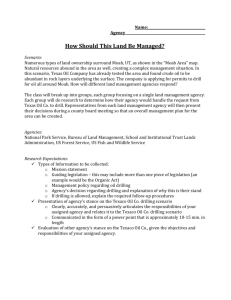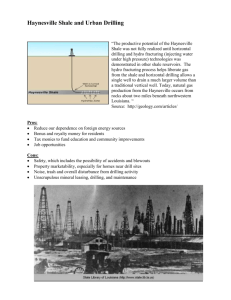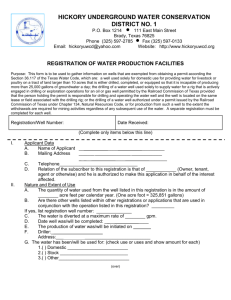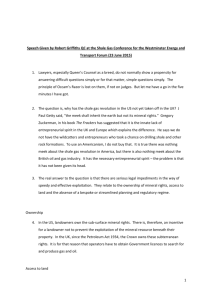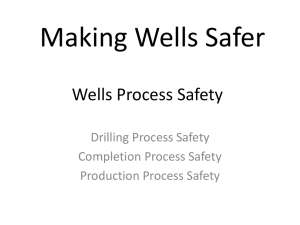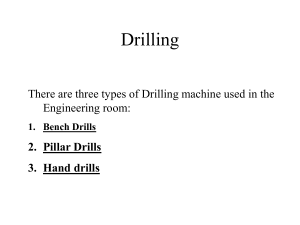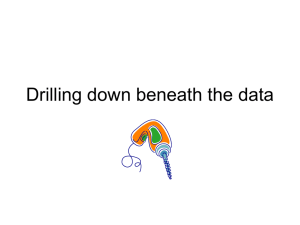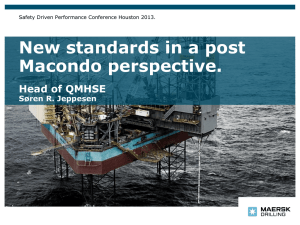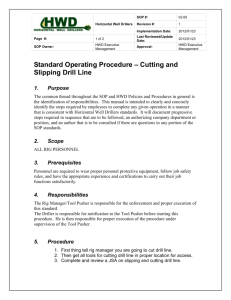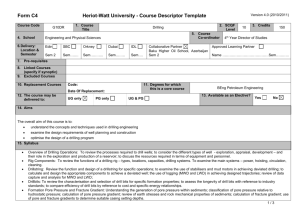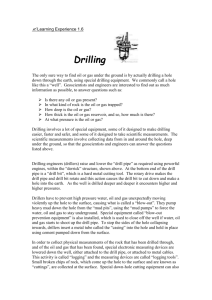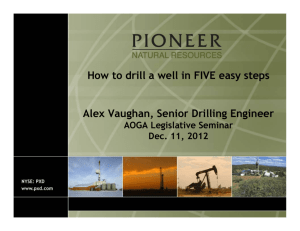discussion key for case #6
advertisement
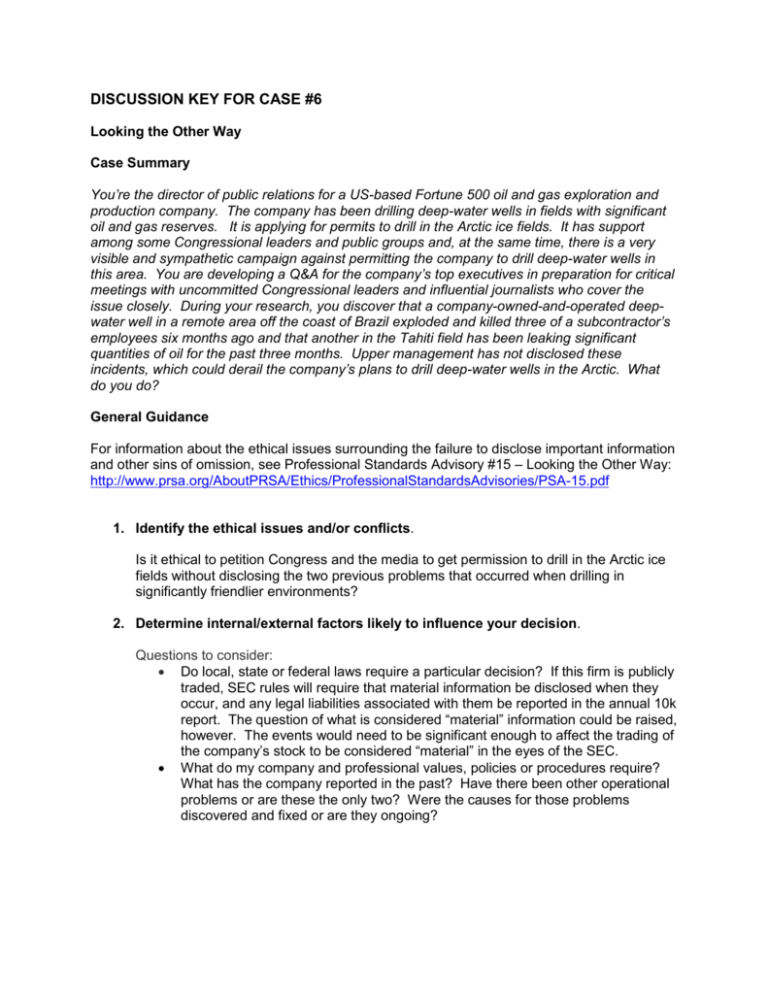
DISCUSSION KEY FOR CASE #6 Looking the Other Way Case Summary You’re the director of public relations for a US-based Fortune 500 oil and gas exploration and production company. The company has been drilling deep-water wells in fields with significant oil and gas reserves. It is applying for permits to drill in the Arctic ice fields. It has support among some Congressional leaders and public groups and, at the same time, there is a very visible and sympathetic campaign against permitting the company to drill deep-water wells in this area. You are developing a Q&A for the company’s top executives in preparation for critical meetings with uncommitted Congressional leaders and influential journalists who cover the issue closely. During your research, you discover that a company-owned-and-operated deepwater well in a remote area off the coast of Brazil exploded and killed three of a subcontractor’s employees six months ago and that another in the Tahiti field has been leaking significant quantities of oil for the past three months. Upper management has not disclosed these incidents, which could derail the company’s plans to drill deep-water wells in the Arctic. What do you do? General Guidance For information about the ethical issues surrounding the failure to disclose important information and other sins of omission, see Professional Standards Advisory #15 – Looking the Other Way: http://www.prsa.org/AboutPRSA/Ethics/ProfessionalStandardsAdvisories/PSA-15.pdf 1. Identify the ethical issues and/or conflicts. Is it ethical to petition Congress and the media to get permission to drill in the Arctic ice fields without disclosing the two previous problems that occurred when drilling in significantly friendlier environments? 2. Determine internal/external factors likely to influence your decision. Questions to consider: Do local, state or federal laws require a particular decision? If this firm is publicly traded, SEC rules will require that material information be disclosed when they occur, and any legal liabilities associated with them be reported in the annual 10k report. The question of what is considered “material” information could be raised, however. The events would need to be significant enough to affect the trading of the company’s stock to be considered “material” in the eyes of the SEC. What do my company and professional values, policies or procedures require? What has the company reported in the past? Have there been other operational problems or are these the only two? Were the causes for those problems discovered and fixed or are they ongoing? What action do I believe is in the public’s best interest? What potential environmental impact will there be if the company is given permission to drill? What are the potential problems that could arise while drilling and what might be the environmental impact? What impact might there be on the country’s gas and oil supplies if the company does not get permission? What might be the impact on gas and oil prices? What actions are in the best interests of my firm and my stockholders? What is the potential impact on stock price if given permission? What is the potential impact if NOT given permission? What is the potential impact on stock price if given permission and a similar crisis to the two other incidents occur? 3. Choose key values that apply. Advocacy. We serve the public interest by acting as responsible advocates for those we represent. We provide a voice in the marketplace of ideas, facts and viewpoints to aid informed public debate. Honesty. We adhere to the highest standards of accuracy and truth in advancing the interests of those we represent and in communicating with the public. Independence. We provide objective counsel to those we represent. We are accountable for our actions. Fairness. We deal fairly with clients, employers, competitors, peers, vendors, the media and the general public. We respect all opinions and support the right of free expression. Consider parties who will be affected by your decision and evaluate the public relations professional’s obligation to each one. 4. Consider parties who will be affected by your decision and evaluate the public relations professional’s obligation to each one. In this case, the two groups most affected by the decision are the general public and the stockholders of the firm. The public could benefit from an increased supply of oil and gas and reduced prices, but could be seriously harmed if the drilling is allowed and there is a major leak. The firm’s stockholders would gain value if permission were granted for drilling, and the stock price would likely drop if not given permission. Other parties affected would be the people and animals living closest to the arctic if a spill were to happen; the employees who would work on the drilling rig and be at risk if another explosion should occur; and the members of Congress who vote for or against the drilling and whose political future could be affected by the decision. 5. Select ethical principles to guide your decision making. Conflicts of Interest: Revealing real, potential or perceived conflicts of interest builds the trust of clients, employers and the public. Disclosure of Information: Failure to expose or challenge bad behaviors, decisions or actions leads to information being hidden when it should be exposed. Enhancing the Profession: Looking the other way presents an extraordinary vulnerability to the profession, because clients and the public look to the professional communicator for sensible, useful, creative help and disclosure in adverse situations. Free Flow of Information: Withholding, embellishing, distorting or outright lying; attempting to interfere with the free flow of information. Safe Guarding Confidences: Client trust requires appropriate protection of confidential and private information. The issue here is intentionally withholding counsel regarding information that should be exposed rather than remain confidential. 6. Make a decision and offer a brief rationale. Besides the ethical issue of being transparent and honest when presenting the company’s case to Congress, there are other practical reasons for disclosing the two previous problems. Given that this is a high-profile issue and media covering the Congressional hearings would likely investigate the company’s history, it is very unlikely that the two previous incidents could remain hidden. If this information is dug up by the media or posted anonymously online by unhappy employees or the families of the deceased, it will likely be slanted to put the company in the worst light and will likely make the firm look dishonest and incompetent. The outcome might not just be denied drilling privileges. It could spur investigations and other actions that would not only drive the stock price down but also hinder future operations. It would be in both the public’s and the stockholders’ best interests to proactively disclose the prior problems but, at the same time, ensure that actions have been put in place to prevent these same problems from occurring again and to also provide that information when presenting to Congress.
